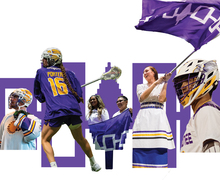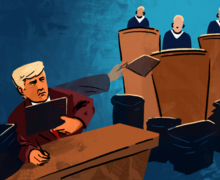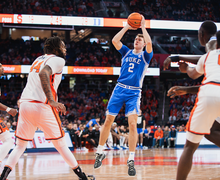IDentity crisis
‘I found a template on the Internet, somewhere. I spent a lot of time making it nice, as realistic as possible,’ he said. Once the template was made, Elkind also found New Jersey holograms online at a Web site that coincidentally shut down shortly after his arrest. Creating fake IDs, especially for buying alcohol, is becoming an increasingly technological field. As states refine their IDs, the technology used to break these barriers is becoming more available over the Internet, creating problems for law enforcement. The Internet has opened doors for many potential forgers and made the materials more available. In early 2000, the U.S. Senate Committee on Investigations examined more than 60 illegal Web sites, where some directly sold completed IDs. Others, though, had seals, barcodes, holograms or templates, allowing individuals to make their IDs at home, which is what Elkind did. After the more difficult template and hologram were done, Elkind said it was simply a matter of taking and touching up a picture, printing the ID and laminating it with a laminator bought at Staples. Elkind charged about $50 each for his IDs, and made about 35 for friends before he was caught by his resident adviser. The RA spotted half-finished IDs in his room in Lawrinson Hall, and the materials were confiscated. After a friend was caught with an ID that was linked to Elkind, the Syracuse Police Department did a follow-up that turned up a few new IDs, and Elkind was arrested. Elkind received a fine, community service and conditional discharge, which is a type of probation that is removed from his record after one year. SU suspended him for one semester, required 50 hours of community service and a written paper, barred him from university housing until 2005 and made him participate in the Options Program, which required drug testing every three weeks and ended just this month.
‘It’s a very hard case for the police to put together to get to the person who is making them,’ said Assistant District Attorney Chris Schlecht. Schlecht said he prosecuted the case of SU junior Cole Harris, who pled guilty to forgery in the third degree, in the intent to defraud or deceive another with a written instrument, on Nov. 5. The case involved exchanges of IDs between Harris and contacts in other states, Schlecht said. Harris declined to comment. ‘This is only my second creating fake ID case in six years, but there have been several hundred instances of possession,’ Schlecht said. The Harris case illustrates the new complexity of the fake ID market. It is becoming harder to track down ID makers because individuals who often get caught with fake IDs order them online and have them delivered by UPS from another state, Schlecht said. ‘Counterfeiting and forgery is the federal crime that is punishable by imprisonment for one to 10 years in jail and a fine of up to $250,000,’ said agent Tim Kirk, of the U.S. Secret Service, Syracuse Field Office. In the first degree, forgery is a felony. Though the Secret Service does not pursue students who make fake IDs for purchasing alcohol, they will fully assist local police departments, Kirk said. Recent changes in certain states’ IDs, especially New Jersey, Maine and New York, are making it an increasing struggle for forgers to keep up with the state’s technology. ‘They are slowly but steadily improving driver’s licenses and making it harder to duplicate them,’ Kirk said. Many states’ Departments of Motor Vehicles are now issuing licenses with new security devices, such as bar codes and magnetic strips coded with an individual’s information, Elkind said. Still, even these precautions are not preventing forgeries. Encoders can be easily bought online, since many small businesses need them. The program can even be downloaded offline, Elkind said. Despite stiff university penalties, students still choose to get fake IDs. Trying to use fake IDs poses a challenge for students, as store owners and bouncers are required to check IDs and turn away students or even confiscate fakes. ‘You turn them away and take their ID, so you never see them again. You lose them also as a customer … but that’s what it is,’ said Amin Raslan, owner of Students Choice Market on Marshall Street, who turns away two to four students each weekend. Raslan has collected IDs from all over the country, including California and Hawaii. ‘We are very aware, we’ve been in this for 25 years, we know what we have to do,’ he said. The head bouncer at Faegan’s Cafe & Pub, who preferred to be known only as Sean, said he often catches students with old New Jersey and Maine licenses because they are easy to reproduce, though he rarely finds students with the more difficult New York IDs. ‘We usually deny (students with fake IDs) and send them away. It’s possible that they may be confiscated, but we don’t really practice that here,’ said Sean, who turns away four or five students during the weekdays. Despite owner and employee vigilance, carefully created fake IDs cannot always be detected. Elkind got into almost all of the bars he used his IDs at, though he has not been to a bar since returning to SU and does not own or make fake IDs anymore. ‘People joke about it, say ‘Wouldn’t it be nice if you still made them,’ but I just change the topic,’ Elkind said. ‘It’s not worth it.’
Published on December 29, 2004 at 12:00 pm





